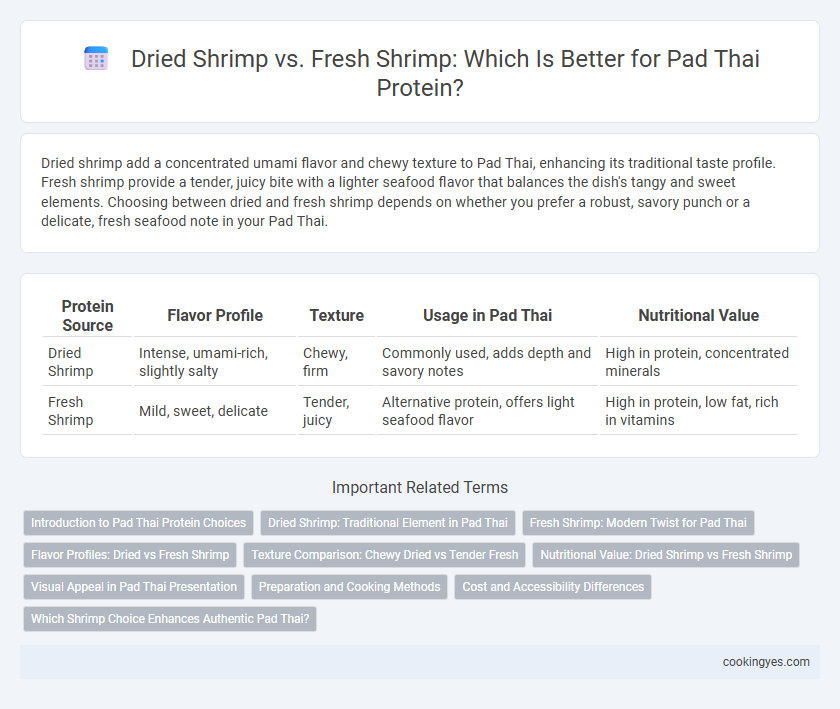Dried shrimp add a concentrated umami flavor and chewy texture to Pad Thai, enhancing its traditional taste profile. Fresh shrimp provide a tender, juicy bite with a lighter seafood flavor that balances the dish's tangy and sweet elements. Choosing between dried and fresh shrimp depends on whether you prefer a robust, savory punch or a delicate, fresh seafood note in your Pad Thai.
Table of Comparison
| Protein Source | Flavor Profile | Texture | Usage in Pad Thai | Nutritional Value |
|---|---|---|---|---|
| Dried Shrimp | Intense, umami-rich, slightly salty | Chewy, firm | Commonly used, adds depth and savory notes | High in protein, concentrated minerals |
| Fresh Shrimp | Mild, sweet, delicate | Tender, juicy | Alternative protein, offers light seafood flavor | High in protein, low fat, rich in vitamins |
Introduction to Pad Thai Protein Choices
Dried shrimp and fresh shrimp offer distinct flavors and textures that impact Pad Thai's protein profile. Dried shrimp provide a concentrated umami taste and chewy texture, enhancing the dish's depth and traditional authenticity. Fresh shrimp deliver a tender, succulent bite with a sweeter flavor, contributing to a lighter and more delicate Pad Thai experience.
Dried Shrimp: Traditional Element in Pad Thai
Dried shrimp are a traditional element in Pad Thai, providing a concentrated umami flavor that enhances the dish's authentic taste. They contribute a distinct savory depth and chewy texture, differentiating Pad Thai from other stir-fried noodle dishes. While fresh shrimp offer a tender bite and mild sweetness, dried shrimp remain a key ingredient for achieving the characteristic savory complexity of classic Pad Thai.
Fresh Shrimp: Modern Twist for Pad Thai
Fresh shrimp offers a tender and juicy texture that enhances the overall flavor profile of Pad Thai, providing a modern twist to this traditional dish. Unlike dried shrimp, fresh shrimp delivers a cleaner, more delicate seafood taste, complementing the tangy tamarind sauce and crunchy peanuts. Using fresh shrimp elevates the protein element, making Pad Thai more appealing to contemporary palates seeking vibrant and fresh ingredients.
Flavor Profiles: Dried vs Fresh Shrimp
Dried shrimp offers a concentrated umami flavor with a slightly salty and nutty taste that enhances the depth of Pad Thai, creating a robust and authentic profile. Fresh shrimp provides a tender texture and a mild, sweet taste that balances the dish's spicy and tangy elements. Choosing between dried and fresh shrimp depends on the desired intensity, with dried shrimp intensifying savory notes and fresh shrimp maintaining a lighter, cleaner protein presence.
Texture Comparison: Chewy Dried vs Tender Fresh
Dried shrimp in Pad Thai provide a chewy, concentrated flavor that enhances the dish's umami profile and adds a satisfying bite contrast to noodles. Fresh shrimp contribute a tender, juicy texture that balances the dish with a subtle sweetness and delicate mouthfeel. Choosing between dried and fresh shrimp influences the overall texture experience, where dried shrimp deliver a robust chew and fresh shrimp offer softness.
Nutritional Value: Dried Shrimp vs Fresh Shrimp
Dried shrimp offers a concentrated source of protein, calcium, and minerals due to its dehydration process, making it nutrient-dense compared to fresh shrimp. Fresh shrimp provides higher moisture content, fewer calories, and is rich in omega-3 fatty acids and vitamin B12, supporting cardiovascular health. Choosing dried shrimp enhances the umami flavor while boosting protein and mineral intake, whereas fresh shrimp delivers lean protein with essential fatty acids for a balanced nutritional profile in Pad Thai.
Visual Appeal in Pad Thai Presentation
Dried shrimp in Pad Thai adds a vibrant orange hue and distinctive texture, enhancing the dish's visual contrast and traditional authenticity. Fresh shrimp offers a plump, glossy appearance with a subtle pink tone that elevates the plate's freshness and appeal. Choosing between dried and fresh shrimp affects not only the flavor profile but also the overall visual presentation crucial for an enticing Pad Thai.
Preparation and Cooking Methods
Dried shrimp in Pad Thai infuses a concentrated umami flavor due to its dehydration process, requiring minimal cooking time and often added near the end of stir-frying to preserve texture. Fresh shrimp offers a tender, juicy bite and needs to be cooked thoroughly in the hot wok to ensure safety and optimal flavor integration. Choosing between dried and fresh shrimp impacts preparation steps and cooking duration, with dried shrimp enhancing depth and fresh shrimp providing a plump, succulent protein element.
Cost and Accessibility Differences
Dried shrimp offers a cost-effective and longer-lasting option for Pad Thai, widely available in Asian grocery stores, making it accessible for home cooks seeking authentic flavor on a budget. Fresh shrimp, while generally more expensive and perishable, provides a tender texture and sweeter taste that enhances the dish's protein quality. The choice between dried and fresh shrimp affects not only cost and accessibility but also the traditional flavor profile and preparation time in Pad Thai recipes.
Which Shrimp Choice Enhances Authentic Pad Thai?
Dried shrimp is a traditional ingredient in authentic Pad Thai, offering a concentrated umami flavor that intensifies the dish's savory profile. Fresh shrimp provides a tender texture and a mild sweetness, complementing the stir-fry without overpowering other ingredients. Choosing dried shrimp enhances the characteristic depth and complexity of authentic Pad Thai, while fresh shrimp delivers a fresher taste and plumper protein bite.
Dried shrimp vs fresh shrimp for Pad Thai protein Infographic

 cookingyes.com
cookingyes.com